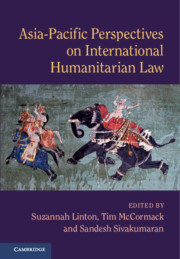Book contents
- Asia-Pacific Perspectives on International Humanitarian Law
- Asia-Pacific Perspectives on International Humanitarian Law
- Copyright page
- Contents
- Figures and Tables
- Contributors
- Foreword
- Foreword
- Acknowledgements
- Editors’ Note
- 1 Introduction: Asia-Pacific Perspectives on International Humanitarian Law
- Part I Interviews
- Part II Development of International Humanitarian Law
- Part III Practice and Application of International Humanitarian Law
- 13 Pacific Island States and International Humanitarian Law
- 14 Challenges of Hybrid Warfare to the Implementation of International Humanitarian Law in the Asia-Pacific
- 15 Counter-Terrorism Law and Armed Conflict in Asia
- 16 Detention in Non-International Armed Conflicts
- 17 The Chemical Weapons Convention in the Asia-Pacific Region
- 18 Wartime Military Sexual Enslavement in the Asia-Pacific
- 19 Protection of Education in Armed Conflict Situations: Asia-Pacific in Focus
- 20 Cyberspace and International Humanitarian Law: The Chinese Approach
- 21 Ethnic Conflicts in Myanmar: The Application of the Law of Non-International Armed Conflict
- 22 The Korean War (1950–1953) and the Treatment of Prisoners of War
- 23 Jihad and International Humanitarian Law: Three Moro Rebel Groups in the Philippines
- 24 International Humanitarian Law in Occupied East Timor: Displacement, Relocation and Famine
- 25 Reinterpreting the Law to Justify the Facts: An Analysis of International Humanitarian Law Interpretation in Sri Lanka
- 26 Japan and Nuclear Weapons
- 27 The Post-War History of Japan: Renouncing War and Adopting International Humanitarian Law
- Part IV Implementation and Enforcement of International Humanitarian Law
- Part V Looking to the Future and Enhancing Compliance with International Humanitarian Law
- Glossary of Publications
- Alphabetical Glossary of Cases and Decisions
- Chronological Glossary of Cases and Decisions
- Treaties and Other International Instruments, Resolutions and National Documents with an International Dimension
- Chronological Glossary of National Legislation and Secondary Instruments
- Peace Agreements and Communiques
- Abbreviations and Translations
- Index
17 - The Chemical Weapons Convention in the Asia-Pacific Region
from Part III - Practice and Application of International Humanitarian Law
Published online by Cambridge University Press: 18 October 2019
- Asia-Pacific Perspectives on International Humanitarian Law
- Asia-Pacific Perspectives on International Humanitarian Law
- Copyright page
- Contents
- Figures and Tables
- Contributors
- Foreword
- Foreword
- Acknowledgements
- Editors’ Note
- 1 Introduction: Asia-Pacific Perspectives on International Humanitarian Law
- Part I Interviews
- Part II Development of International Humanitarian Law
- Part III Practice and Application of International Humanitarian Law
- 13 Pacific Island States and International Humanitarian Law
- 14 Challenges of Hybrid Warfare to the Implementation of International Humanitarian Law in the Asia-Pacific
- 15 Counter-Terrorism Law and Armed Conflict in Asia
- 16 Detention in Non-International Armed Conflicts
- 17 The Chemical Weapons Convention in the Asia-Pacific Region
- 18 Wartime Military Sexual Enslavement in the Asia-Pacific
- 19 Protection of Education in Armed Conflict Situations: Asia-Pacific in Focus
- 20 Cyberspace and International Humanitarian Law: The Chinese Approach
- 21 Ethnic Conflicts in Myanmar: The Application of the Law of Non-International Armed Conflict
- 22 The Korean War (1950–1953) and the Treatment of Prisoners of War
- 23 Jihad and International Humanitarian Law: Three Moro Rebel Groups in the Philippines
- 24 International Humanitarian Law in Occupied East Timor: Displacement, Relocation and Famine
- 25 Reinterpreting the Law to Justify the Facts: An Analysis of International Humanitarian Law Interpretation in Sri Lanka
- 26 Japan and Nuclear Weapons
- 27 The Post-War History of Japan: Renouncing War and Adopting International Humanitarian Law
- Part IV Implementation and Enforcement of International Humanitarian Law
- Part V Looking to the Future and Enhancing Compliance with International Humanitarian Law
- Glossary of Publications
- Alphabetical Glossary of Cases and Decisions
- Chronological Glossary of Cases and Decisions
- Treaties and Other International Instruments, Resolutions and National Documents with an International Dimension
- Chronological Glossary of National Legislation and Secondary Instruments
- Peace Agreements and Communiques
- Abbreviations and Translations
- Index
Summary
Limits, restrictions and, in some cases, prohibitions on the use of certain weapons have always fallen within the scope of international humanitarian law (IHL). The first formal international agreement to prohibit the use of a particular weapon was the St Petersburg Declaration of 1868, which prohibited the use of explosive projectiles under 400 grammes in weight. In the 150 years since then, many other treaties and agreements have restricted or prohibited the use of certain weapons in war. These particular examples of limiting or prohibiting the use of weapons are specific instances of the more general rule that belligerents do not have an unlimited power in the adopting of means of injuring the enemy.
- Type
- Chapter
- Information
- Asia-Pacific Perspectives on International Humanitarian Law , pp. 267 - 280Publisher: Cambridge University PressPrint publication year: 2019



